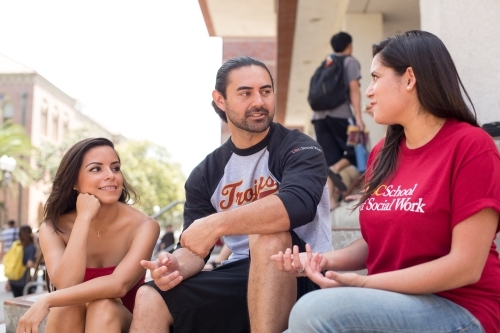Stipends
At the Suzanne Dworak-Peck School of Social Work, we prepare our students for a life of impactful work. To help our graduates promote lasting social change, our faculty delivers bold, principled and forward-thinking training, blending classroom instruction with real-world training.
As important as your training is, making the most of your time at the school can be difficult if you're worrying about how to pay for it. Our Stipend Wizard helps you hone in on relevant stipends and scholarships to help you pay for your world-class education.
How the Workforce Development Stipend and Scholarship Programs Work
The Office of Recruitment and Workforce Development (ORWD) was specifically formed to create a robust stipend program that connects MSW students with organizations and areas of practice with a high need for qualified social workers. Students receive a financial incentive in the form of a stipend or scholarship that requires workforce development responsibilities during the MSW program and after graduation. Stipend/scholarship recipients benefit from specialized curriculum and practicum placements.
In practice, this means that students with financial concerns can still attend USC and make a difference in their communities. But workforce development goes beyond money. According to a recent article, "the ORWD provides an integrated approach, with many stipend programs providing specialized training, internships and priority job placement in social service agencies upon receipt of their MSW degree, allowing fresh graduates to realize their dreams right away."
All Workforce Development Stipend Opportunities
GSWEC
10+ stipends
The Geriatric Social Work Education Consortium offers a stipend ranging from $1,000 to $8,000.
LAC DCFS
30 stipends
The stipend offered by the Los Angeles County Department of Children and Family Services is $52,000 over two years.
LAC DMH
10+ stipends
The Los Angeles County Department of Mental Health offers an $18,500 stipend.
PBH
16 stipends
The Public Behavioral Health MSW Training Program offers a stipend of $25,000 per academic year.
RecoverUSC
48 stipends
The RecoverUSC: Addiction Treatment Certification Project offers a $20,000 stipend per academic year.
SWJJ
10 stipends
The Social Work in Juvenile Justice program offers a stipend of $40,000 per academic year.
Students can apply to workforce development stipend/scholarship program from an area(s) of focus based on their interests. Stipend/scholarship programs differ in length, funding, requirements and competitive application processes.
Please keep in mind that these programs rely on the availability of external funding every year. Some stipend scholarships are able to be compounded with one another.

If your stipend award doesn't cover the full amount of your tuition, we can help you find other ways to afford this life-changing experience.